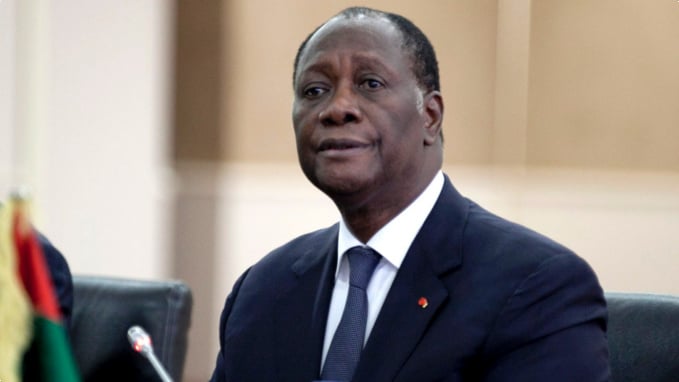Ivory Coast’s President, Alassane Ouattara, has won a fourth term, securing a crushing 89.77 percent of the vote in an election from which his two greatest rivals were barred, the electoral commission announced on Monday.
Nearly nine million voters were eligible to cast their ballots on Saturday in the world’s top cocoa-producing nation, which has largely resisted coups and jihadist attacks plaguing much of West Africa.
However, tensions soared and deadly violence erupted in the run-up to the election.
Even before the provisional results were announced, Ouattara was widely expected to have swept the polls, after early tallies on Sunday showed him winning upwards of 90 per cent of the vote.
Turnout was close to 100 percent in his northern strongholds.
The political veteran was also ahead in traditionally pro-opposition areas in the south and parts of the economic hub, Abidjan, where polling stations had been almost empty on Saturday.
Entrepreneur Jean-Louis Billon came second to the veteran leader with 3.09 percent, said commission president Ibrahime Kuibiert Coulibaly, who announced a 50.10 percent turnout — similar to 2020, when Ouattara won 94 percent of the vote in an election boycotted by his main opponents.
This time, Ouattara’s leading rivals — former president Laurent Gbagbo and Credit Suisse ex-CEO Tidjane Thiam — were both barred from contesting, Gbagbo due to a criminal conviction and Thiam for having acquired French nationality.
“Their absence, their calls not to participate in the election, and the climate of tension that deteriorated in recent days foretold a significant demobilisation of the electorate,” said William Assanvo, a researcher at the Institute for Security Studies (ISS).
In the southern city of Gagnoa, Gbagbo’s former stronghold, Ouattara won 92 percent of the vote, but with a turnout rate of only 20 percent.
The opposition has already denied “any legitimacy” to Ouattara’s victory and has called for new elections.
‘A Calm Election’
Political analyst Geoffroy Kouao believes “the turnout rate shows two things.”
“First, Mr. Ouattara’s supporters turned out in force, as shown by the Soviet-esque results in certain regions,” Kouao said.
“And second, supporters of Gbagbo and Thiam’s parties did not go to the polls.”
Billon also expressed concern on Sunday about “very low turnout in some regions,” while still offering congratulations to Ouattara.
Billon and the other candidates on the ballot — including former first lady Simone Ehivet Gbagbo — stood little chance of reaching a second round due to a lack of backing from major parties or significant financial resources.
Earlier calls for protests by the main opposition had led to deadly unrest in the run-up to the election, with at least eight people killed this month and nearly two dozen injured in election-day clashes at some 200 polling stations.
The government had declared a nighttime curfew in some areas and deployed 44,000 security forces nationwide.
Presidential elections in Ivory Coast are often fraught with tension and unrest. Ouattara first came to power following the 2010–2011 post-election crisis between him and Laurent Gbagbo, which left more than 3,000 people dead among their supporters.
On Monday, Abidjan returned to near-normal activity after the capital was unusually deserted over the weekend.
“The Ivorians said NO to prophets of doom,” headlined Patriote, a pro-Ouattara newspaper, praising “a calm election.”
The opposition daily Notre Voie, however, described it as “an election reflecting a divided country.”
AFP


